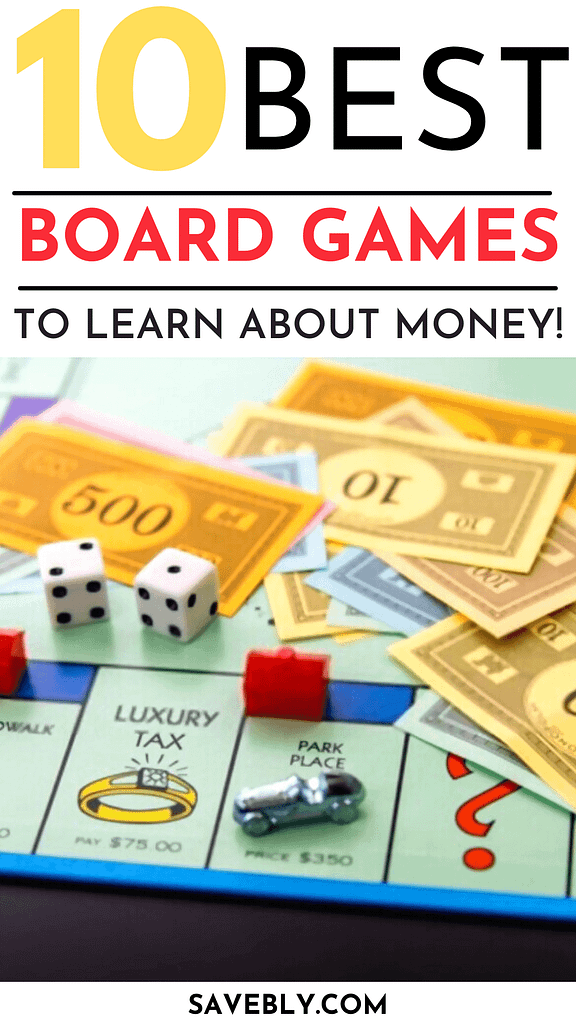10 Best Board Games About Money
Disclosure: This post may contain affiliate links and if you choose to sign up or purchase a product/service through our links we may receive a commission at no cost to you. Please read our full privacy policy for more information.
One of the best ways to teach your children about personal finance is to use board games about money.
You can have a family game night where you play board games that focus on money which will help your kids learn more about personal finance!
Game nights with family and friends are fantastic. Board games can teach kids various life skills, including interpersonal communication, problem-solving, and friendly competition.
Plus, kids love playing games, especially when they can beat their parents!
Now imagine your game nights could also help teach your children financial literacy skills. The key is to have fun and keep the kids from realizing they are being taught a valuable skill.
Here are ten board games about money you can get right now…
Payday
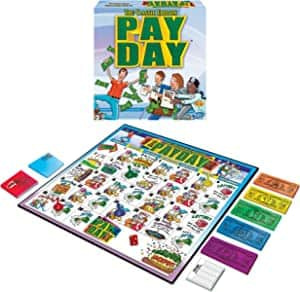
The classic game of Payday makes family finance fun, reminding everyone where the money goes.
This is a game of making and spending money! You’ll make money every month, but you might spend it just as fast.
It has been around since 1975, and it’s just fun and educational!
You move your piece around the board, and you’ll either land on a space to make money or on a space that costs you money.
This board game teaches your kids about the ups and downs of finance, you get to make money, but it can be gone in the blink of an eye.
Ages: 7+
Number of Players: 2+
What Payday Teaches About Personal Finance: Careers, lending money, paying bills, paying interest, and dealing with unexpected expenses.
Moneywise Kids
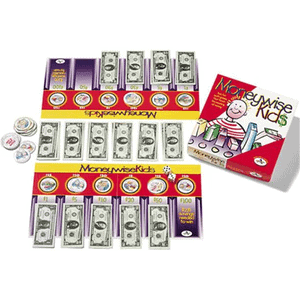
Moneywise Kids is a great board game about finance to improve valuable math skills that kids will use all their lives, like making changes and budgeting money.
In the game, each player starts with $100 and earns money for each roll (based on the die’s value).
However, they must also draw markers for actual life expenses – like food and taxes – that they can purchase or put back to buy later.
The winner is the first to have six “moneywise” expense tokens and still have $100 in the bank!
It’s one of the best board games about money that the entire family can play for some educational fun!
Ages: 7+
Number of Players: 2
What Moneywise Kids Teaches About Personal Finance: Paying bills, money math, saving before spending.
Monopoly
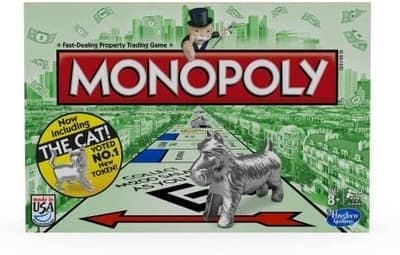
Of course, this has to be on the list. We all know about the classic, fast-dealing property trading game Monopoly.
Put your token on the Go space and roll the dice to own it all in the fast-paced world of real estate.
Make a move, make a deal, and make a fortune to win it all. There can be only one winner in the Monopoly game.
Monopoly is more geared toward older kids or adults to learn about risk vs. reward.
While Monopoly is about the value of property ownership rather than the basics of personal finance, it teaches some great lessons, such as debt’s impact!
I highly recommend playing Monopoly with the entire family since it’s a classic and one of the best board games about money.
Ages: 8+
Number of Players: 2+
What Monopoly Teaches About Personal Finance: Money Management, decision making, investments, and long-term payoffs.
The Game of Life
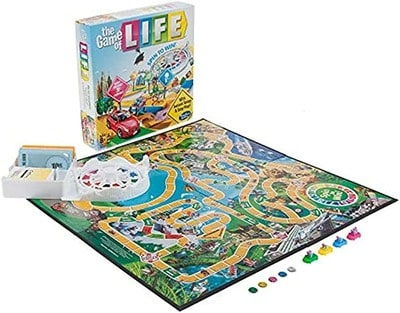
Do you have what it takes to win The Game of Life? You do it by choosing the life you want!
Go to college, take the family path, have kids, or see what happens when unexpected twists change the game.
Will you receive a fortune and lose it as quickly as you got it? Will you need a bank loan to pay a debt?
Once everyone reaches the end of the game at retirement, everyone pays their debts and adds up their wealth.
The player with the most money wins the game, so make sure it’s you! It’s all your choice when you play The Game of Life!
The name gives it away, but to clarify, this is one of the best board games about money due to how realistic it is about your life decisions.
Ages: 8+
Number of Players: 2+
What The Game of Life Teaches About Personal Finance: Decision-making about your career, college, marriage, children, and insurance.
ACT Your Wage!
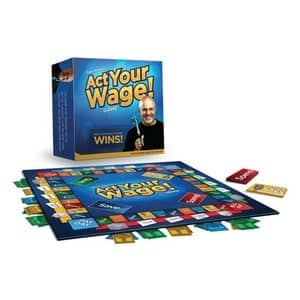
Act Your Wage is a great board game about finance based on Dave Ramsey’s Baby Step 2.
The goal of this board game is to be the first to yell, “I’m debt free!” by paying off every debt except your mortgage.
This board game is a fun way for anyone to learn the principles of saving and spending!
Have a family game night or invite friends over to play. It’s always competitive and fun.
Ages: 10+
Number of Players: 2-4
What ACT Your Wage Teaches About Personal Finance: Budgeting, debt reduction, Dave Ramsey’s 7 Baby Steps.
Charge Large
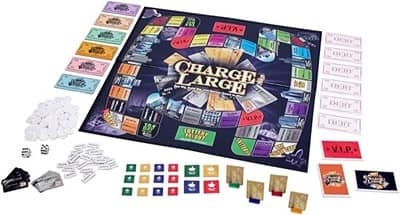
In today’s economy, getting and keeping good credit can be challenging.
But now you can take the crunch out of credit with Charge Large, the game that makes buying, building, and even borrowing pay off big!
Travel around the board using cash and your gold credit card to scoop up prime properties.
Buy strategically, borrow wisely, and pay back quickly to earn a platinum card. (It also helps to hit the lottery and collect rent!)
If you’re the first to have cash, a zero credit balance, and the coveted black credit card, you’ve beaten the credit card blues and won the game!
Ages: 12+
Number of Players: 2-4
What Charge Large Teaches About Personal Finance: Borrowing money, credit, credit cards, money management.
Acquire

Each player strategically invests in businesses in Acquire to retain most of the stock.
As the businesses grow with tile placements, they also merge, giving the majority stockholders of the acquired business sizable bonuses, which can then be reinvested into other chains.
All of the investors in the acquired company can then cash in their stocks for current value or trade them 2-for-1 for shares of the newer, larger business.
It’s a more involved board game about money so it’s geared towards older kids or adults to learn about the value of investing.
The game is a race to acquire the greatest wealth!
Ages: 12+
Number of Players: 3+
What Acquire Teaches About Personal Finance: Stocks, Trading, Stockmarket, Money Management.
Bulls and Bears
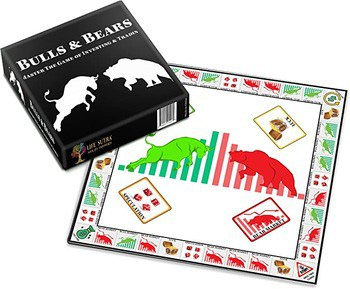
Learn the ropes by making real-life investment decisions, responding to the market news, balancing your portfolio, planning for retirement, managing debt, and answering questions about the fundamentals of economics and finance.
But beware: While skill and sound practices are essential, unexpected events – and mean opponents – can upend the most well-thought-out plans, so get ready for a wild ride.
Just like the board game Aquire, since Bulls and Bears is an investing game, it’s best for older kids and adults.
It’s a great game to understand the foundations of investing and how you can make money or lose money, depending on your decisions!
Ages: 13+
Number of Players: 2-6
What Bulls and Bears Teaches About Personal Finance: Investing, basic economics, retirement planning, balancing portfolios and budgets.
Cashflow 101
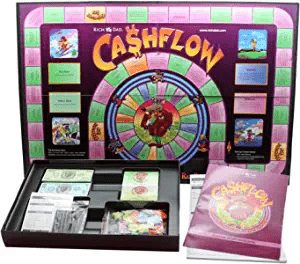
Play your way out of the rat race by generating passive income through real estate, stocks, companies, and more with Cashflow 101.
The Cashflow starts you in a typical 9-to-5 drag of a job, and from there, you’ll battle to acquire stocks, houses, apartments, companies, and more to build up your passive income until you graduate from the rat race to the fast track (Where the real money is made).
It’s one of the best board games about money that will teach you about the importance of acquiring assets and diversifying your income!
Ages: 13+
Number of Players: 1-4
What Cashflow Teaches About Personal Finance: Investing, passive income, managing a checkbook.
The Allowance
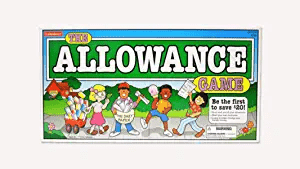
One of the best financial board games for younger kids is The Allowance.
It teaches the basics of money, which is perfect for younger kids because it’s easy to understand and fun!
Players will earn money by completing chores or tasks and can use that money to purchase items such as toys, candy, and games, but they will encounter unexpected events that cost money.
So, players will have to be strategic about their money and learn the value of money and the importance of saving.
It’s a great game that will teach kids about finance while keeping them entertained, so it’s definitely worth checking out!
Ages: 5+
Number Of Players: 2 – 4
What The Allowance Teaches About Personal Finance: Making money from working, saving, budgeting, and making financial decisions.
Conclusion
These are the ten best board games about money that the entire family can play to have fun while learning about personal finance!
Board games are a great way to teach kids about personal finance and financial literacy.
I highly recommend grabbing a few of these board games for a family game night!
If you like this post, then I recommend checking out my posts on Financial Literacy For Kids: 10 Best Methods and 16 Best Money Books For Kids To Learn Personal Finance.
Which of these board games is a family favorite? Have any other games to add? Let me know in the comments below!
